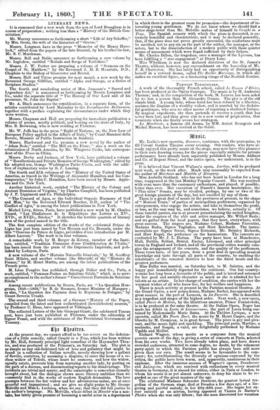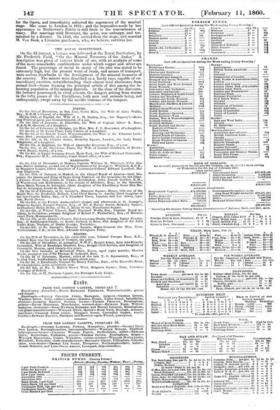n sir .
Mr. Leslie's new operetta, Romance, continues, with the pantomine, to fill Covent Garden Theatre every evening. Our readers, who have al-
-ready enjoyed this pretty music on the stage, may now have this pleasure in their own drawing rooms, for the pieces especially suitable for private performance have already been separately published by Messrs. Addison and Co. of Regent Street, and the entire opera, we understand, is in the press.
It is believed that Vincent Wallace's opera, Lurline, will be produced next week, or the week after. Much may reasonably be expected from the author of ifaritana and Matilda of Hungary.
Miss Arabella Goddard, wbo has not been heard in London for a long time, reappeared at the last Monday Popular Concert. She was received with even more than the customary enthusiasm, and played, if possible, better than ever. Her execution of Dussek's famous masterpiece, the " Plus ultra" Sonata, may be rivalled, perhaps, by one or two of the great foreign pianists of the day, but not excelled by any of them. There is a great deal of music in the provinces at present, in the shape of " Musical Tours," of parties of metropolitan performers, organized by entrepreneurs, who engage the artists, and take to themselves the profit,
or loss, as the case may be, and sometimes, we believe, actually is. Of these tuneful parties, one is at present perambulating the united loingdom,
under the auspices of the able and active manager, Mr. Willert Beale ; and we gather from the local papers, that they meet, everywhere, with great success. The singers are, Madame Cobari, Madame Fiorentini, Madame Badia, Signor Tagliafico, and Herr Reichardt. The instru- mentalists are Signor Sivori, Signor Bottesini, Mr. Brimley Richards, and Herr Engel, the performer on the harmonium. The concerts are conducted by Mr. J. L. Hatton. The party have been at Manchester,
Hull, Dublin, Belfast, Bristol, Exeter, Liverpool, and other principal towns in England and Ireland, and all the provincial critics warmly eulo- ' e the arrangement of the concerts, and the quality of the performers. These tours have, of late years, done a great deal in spreading musical
knowledge and taste through all parts of the country, by enabling the inhabitants of the remotest districts to hear the finest music and the greatest performers. Miss Dolby was married, on Saturday last, to M. Sainton, and the happy pair immediately departed for the continent. Our fair country- woman has long been a favourite of the public, and is loved and esteemed for her good and amiable character as much as she is admired for her talents as an artiste. In her change of condition, she carries with her the warmest wishes of all who know her, for her welfare and happiness.
There is much activity at present in the Parisian musical theatres. At the Grand Opera, a new prima donna, Madame Barbot, has appeared with
great success, in the part of Leonora, in La Favorite. She is described as a tragedian and singer of the highest order. Next week, a new opera, called .Pierre de Medicis, by the illustrious amateur, Prince Poniatowski,
is to be produced at the same theatre. At the Italian Opera, Roger has
made his debut in Lucia di Lammermoor, the part of Lucia being sus- tained by Mademoiselle Marie Battu. At the Theatre Lyrique, a new operetta, called Ma Tante Dort, the music by M. Henri Casper, and the libretto by M. Cremieux, is in great favour. The piece is gay and plea- sant, and the music light and sparkling. The principal parts, Martine, a soubrette, and Scapin, a valet, are delightfully performed by Madame Ugalde and Meillet. - Richard Wagner, whose merits as a composer form the musical gucestio meta of the day, is giving a series of concerts at Paris, selected
from his, own works. Two have already taken place, and have drawn crowded audiences, attracted in some degree, no doubt, by the vehement party spirit to which the Parisian public has always been still more given than our own. The result seems to be favourable to the com- poser; for, notwithstanding the diversity of opinions expressed by the critics, the public have been warm, and, apparently, unanimous in their
applause. After the immense success of Wagner's operas, Tannhauser and Lohingrini, which are received with enthusiasm in every musical theatre in Germany, it is absurd for critics, either in Paris or London, to whom his music is as yet almost unknown, to deny his claim to be re- garded as one of the great masters of the age. The celebrated Madame Schroeder Devrient, the greatest lyrical tra- gedian of the German stage, died at Dresden a few days ago, of a lin- gering and painful malady, in her fifty-fifth year. She began her ca- reer entirely as an actress, having appeared at. Vienna in Racine's Phedre when she was only fifteen ; but she soon discovered her vocation
for the Opera, and immediately achieved the supremacy of the musical stage. She came to London in 1831; and the impression made by her appearance in Beethoven's Fiddle is still fresh in the remembrance of many. Her marriage with Devrient, the actor, was unhappy, and ter- minated by a divorce. In 1849, she retired from the stage, and married M. Von Bock, a Livonian gentlemen, who, we believe, survives her.































 Previous page
Previous page